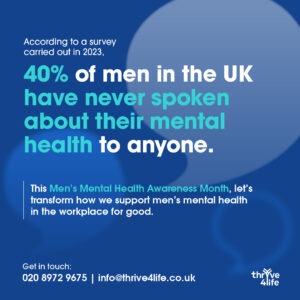Men’s Mental Health Awareness Month: Supporting Men in the Workplace
When was the last time you heard a man talk openly about his mental health?
This November is Men’s Mental Health Awareness Month – a vital opportunity to increase the scale of the conversation surrounding men’s mental health, raise awareness of men’s mental health issues, and do more to support men’s emotional wellbeing across the UK.
Mental health issues can affect anyone, regardless of gender. However, prevailing stereotypes and societal constructs surrounding masculinity and how men ‘should’ behave can be especially dangerous for men’s mental health. The damaging stereotype that equates emotional vulnerability with a lack of masculinity leaves many men struggling with mental health issues feeling isolated and ashamed, as though they are failing to live up to society’s expectations of ‘manliness’. One 2023 survey carried out by Priory has found that 40% of men in the UK have never spoken about their mental health to anyone.

However, with 32% of men identifying work as their most significant cause of stress, it’s clear that all too often, men do not feel supported in the workplace. In this blog post, we’ll explore how you can mark Men’s Mental Health Awareness Month in your workplace and create a safe environment year-round for male employees to open up about their struggles.
How the Workplace Affects Men’s Mental Health
The workplace can be a stressful environment for us all, but the pressure put on men to conform to stereotypes of masculinity by staying silent and stoic about their struggles can make it even more difficult for them to seek and receive mental health support. Here are some ways that the workplace can affect men’s mental health:
- Pressure and demanding targets – Research shows that men often work in jobs that create high-pressure environments with difficult-to-reach employee targets. Workplaces like this can cultivate a pressure-fuelled systemic fear of failure within an organisation, where stress levels skyrocket as employees consistently overwork to meet demands.
- Job instability and financial worries – Research shows that financial anxiety is one of the primary contributing factors of mental health issues in men, with 31% saying that it was the most significant cause of their struggles. Men who suffer high levels of money-related stress are more likely to experience depression than men who have fewer economic worries.
- Lack of understanding and support from employers – Only 24% of managers have received mental health training and guidance on spotting the signs that indicate their employees might be struggling. This lack of management-level mental health awareness makes employees less likely to feel comfortable talking about how work is affecting their mental health, with only 55% of men feeling able to speak to their manager about high levels of work-related stress.
Signs that Male Employees May Be Struggling
Generally, the signs of mental ill health are similar across all genders, though there can typically be some differences. Behaviours that indicate one of your employees may be struggling include:
- Being less enthusiastic about their job.
- Withdrawing socially from friends, family, and colleagues.
- Demonstrating persistent worry or seeming anxious or on edge.
- Turning up to work late more often or frequently absent.
- Struggling with fatigue, headaches, or shortness of breath.
- Difficulty concentrating, including on work tasks.
According to a 2023 study carried out by Priory, it is common for men struggling with their mental health to experience or display signs of:
- Substance abuse, such as drugs or alcohol.
- Becoming easily irritable or angry.
- Sleep problems.
- Reckless behaviour.
Did You Know?
The biggest cause of death for men under 50 years old in the UK is suicide. This shocking statistic demonstrates how important it is to do everything we can to break down the stigma surrounding men’s mental health, learn ways to care for your mental health and take practical, comprehensive steps to care for men’s mental health across our workplaces (as part of a strategy that targets all employees, regardless of gender).
How Employers Can Support Male Employees
Once you know how to recognise the signs that a team member may be struggling, it’s essential to understand how you can help them. Creating a supportive environment filled with open communication, trust, and effective health and wellbeing provisions will not only benefit your employees but will positively impact your whole company, with happier staff being more productive, motivated, and ready to work.
- Be open about your own experiences – Talking openly and without shame about any mental health struggles you’ve experienced will show your employees that their workplace is a safe place to discuss their mental health difficulties and get help – all without any judgement or negative consequences for their jobs. Male employers, in particular, should do this, as it shows other men in the workplace that they shouldn’t be afraid to speak out.
- Train managers in mental health – By training your managers in mental health awareness, you’ll give them the knowledge they need to help their employees. At Thrive4Life, we offer a Line Manager Mental Health Training Course. This 90-minute course equips line managers with everything they need to support their staff as efficiently as possible. Topics covered include identifying the warning signs of mental health issues, crisis management, and how managers can help struggling employees.
- Offer activities to get involved in – Organising fun activities for your team inside and outside work promotes a healthy work-life balance. The activities could include setting up a summer sports game between staff, organising a weekly running club, or arranging an organisation-wide team picnic when the weather is good. Activities such as these will also allow you to talk more to your employees and show them that you care about their wellbeing outside of work.
- Give employees someone to talk to – It can be helpful for employees to have a specific person they know they can talk to. Thrive4Life’s Mental Health First Aider Course trains an employee/s of your choice to recognise the signs of mental health difficulties in the workplace, allowing them to step in and help. We also offer a refresher course for those who want to renew and update their skills.
- Encourage education and awareness – Raising awareness around mental health helps to reduce the stigma associated with mental illness. Thrive4Life offers multiple resources to help you promote health and wellbeing amongst your team:
- Workplace Wellbeing Talks – these can be attended in person and online and cover various wellbeing topics, including the effects of stress on your mind and body, how to maintain a healthy work-life balance, and men’s health.
- Wellbeing Champions – this training helps you create a team of health and wellbeing ambassadors who can promote awareness of health and wellbeing and support your team with their physical and mental health.
- Health and Wellbeing Newsletters – subscribe to our monthly health and wellbeing newsletters to provide your employees with educational and engaging content covering critical areas of health and wellbeing.
How to Look After Your Mental Health
Whilst a supportive workplace is vital, looking after your mental health is just as crucial. Here are some ways you can do this:
- Use your lunch break– Most jobs have a lunch break written into employees’ contracts, but many employees repeatedly skip it to get work done, which can harm mental health. A break can help you feel more productive, while eating a balanced, healthy meal will help you stay energised into the afternoon. You could even take this time to go for a walk or practise some relaxation techniques.
- Set clear boundaries between work and home – A healthy work-life balance is essential. If you need to work from home, having a separate area in the house that you stick to is a good idea so you don’t associate where you usually rest with work. Avoid overtime when you can so that long work hours don’t eat into your personal life.
- Connect with others – It’s critical to have friends and family around you to spend time with and ask for support. If you’re finding it hard to get a date in the diary to meet up, organise a phone call, text a loved one, or send a voice note. If you’re struggling, finding the motivation to socialise can be difficult, but it couldn’t be more critical to try your best to keep engaged with your support system.
Places to Get Support
It might be helpful to contact a support group dedicated to men’s mental health.
- James’ Place – offers free treatment to men in Liverpool, London, and Newcastle who are struggling with suicidal thoughts and feelings.
- Andy’s Man Club – helps men with mental health difficulties and holds support groups in over 150 locations around the UK.
A Closing Note
Sadly, men have historically faced a lot of stigma surrounding their experiences of mental health struggles, and this makes it extremely important to raise awareness and encourage anyone struggling with their emotional wellbeing to speak out. It’s crucial to develop a supportive workplace and offer help to male employees who are experiencing mental health difficulties. This Men’s Mental Health Awareness Month, open up about your mental health and talk to the men in your lives about their emotional wellbeing, showing them support and compassion, whether they’re friends, family, or colleagues.
From Concerns to Clarity: Prioritising Men’s Health This Movember
In this talk, Mr Arumuham will raise awareness of key men’s health issues and explore the importance of being proactive and taking early action to address any health concerns. He’ll cover a range of topics, including prostate health and mental health.
Click here to organise access to this event for you and your team!










